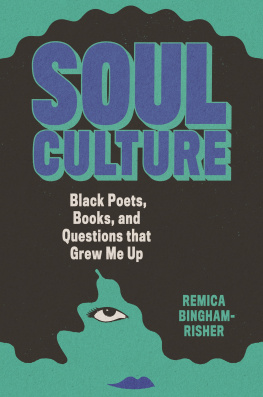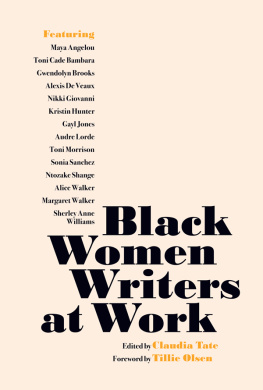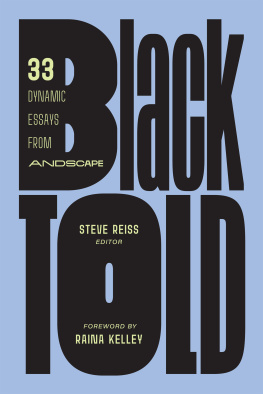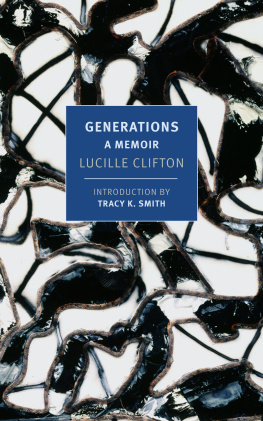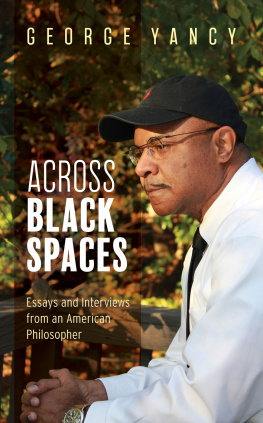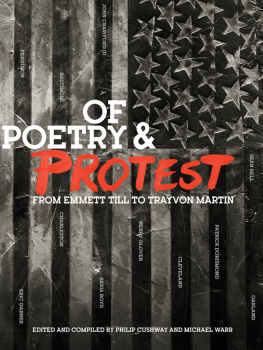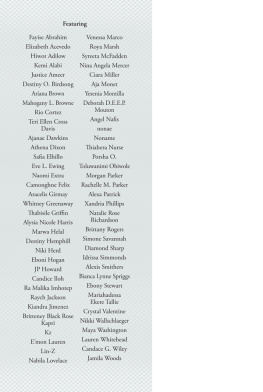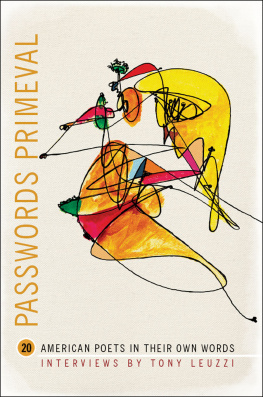Contents
Pagebreaks of the print version
Guide
PRAISE FOR SOUL CULTURE
This book is miraculous! Remica Bingham-Risher dives deep into not only Black poetry and philosophy, but also the lived lives of Black poets and the insights that are found there. From these troves, Bingham-Risher weaves together a book of knowledge, illumination, and song unlike any I have known, but that I might have dreamed.
ELIZABETH ALEXANDER
This is not an objective endorsement of Soul Culture, so please dont expect thatinstead, this is a praise song for Remica Bingham-Risher. This is a gratitude moment for her devotion to Black poetry and Black poets. This is an embrace for a sweet, loving baby who has assembled here a beautiful community, who names our souls in wonder and so much grace. How I love this woman, her genius, her immense spirit! How grateful I am to be part of this remarkable gathering!
HONORE FANONNE JEFFERS
Soul Culture is the nourishment, the love, the light, the dark, the beauty. With a genius all her own, and in the blackest ink, Remica Bingham-Risher has woven us a gorgeous, intergenerational, and polyvocal history of kinship, perseverance, Black poetry, and love. I laugh, I cry, I am swung open by her radical, radiant attention. This book is a devotion. I want to share it with everyone I love.
ARACELIS GIRMAY
In Soul Culture, Remica Bingham-Risher has produced a chronicle of some of her important influences in the form of these interviews conducted with several of them, and in expressing her concrete gratitude with this book she has also produced another important documentation of how African American poets have become a realized force in American literature. Each interview is a doorway to understanding the remarkable achievements of Black poets, beginning with the postHarlem Renaissance generation, many of whom are part of the Black Arts Movement. The opening interview with E. Ethelbert Miller gives us the sensibility of a poet whose writing, mentoring, and archival contributions have been a central nervous system for Black literature, thus clearly establishing the richness of this collection. In her own work and life, Ms. Bingham-Risher is an ambassador for Cave Canem, the organization that received the National Book Critics Circles first Toni Morrison Award. For those looking to explore some of the tapestry of the emergence on Black poetry from the mid-twentieth century into the twenty-first, this book will be invaluable. In the faces of these faces you will see the Black and unknown bards as well as those who were first to have achieved careers: Phillis Wheatley, Jupiter Hammond, and the whole stream of us, known and unknown, but all so brave and full of hope in the collective genius of African American poetry.
AFAA M. WEAVER
Remica Bingham-Rishers reverence for Black poetry and Black poets shines through in this collection of essays. What do we save for our children? Remica asks. What home do we carry? Which ghosts do we let sleep? While this collection keeps a beautiful record of the giants who came before us in Black poetry, it also accepts that the poets of today will one day be homes for the poets of the future. She asks us to consider what kind of homes we will be. In Black poetry, the elders have made a place for us, Remica says. So now, in their wake, what are we trying to build? She builds a bridge between the past and the future, gently nudging todays poets to consider their place. This deliciously written collection will have you wanting to exchange emails with Aracelis Girmay, share drinks with Remica and her cousins, and, of course, attend the familys The Color Purple breakfast. Remica invites you in.
ALINE MELLO
Soul Culture is a necessary guide to transcendence in the twenty-first century, a nexus of ancestors, elders, and the wise among us.
TRACY K. SMITH
Remica Bingham-Rishers Soul Culture is more map than book. Reading you ask, as an early Roots album once did, Do you want more?!and a reader cant help but to want more of this exploration of self and Black poetry. A spectacular and compelling way of turning the vehicle of poetry as a tool to remember the past and examine it.
REGINALD DWAYNE BETTS
Remica Bingham-Rishers beautiful book Soul Culturepart writers memoir, part literary and cultural history, part conversation, part writers guideis at root a love song for the writers who have made Bingham-Rishers work and life possible (who happen also to be the writers who have made a lot of our writing lives possible). We do not arrive, Soul Culture reminds us, without the labor and love of who comes before us. We do not arrive without who dreamt us into being. Soul Culture honors that labor and love and dreaming. Soul Culture sings it. How necessary, how gorgeous, how true.
ROSS GAY
Love made this book: love for Black people, for poetry, and for anyone ready to embrace both. Remica Binghams Soul Culture reinvents the literary interview, the artists memoir, and the craft essay, by bringing all three together into a delicious, illuminating, deeply moving whole. Bingham invites you into her life as a Black woman in the USshows you the things that have wrecked her and the things that have saved herand opens up, in the process, new definitions of faith, Blackness, and the word. Soul Culture is testimony and trailblazing; it is book, chapter, and verse on the ways one might make a writing lifeor let a writers life-work (re)make you.
EVIE SHOCKLEY
OTHER BOOKS BY REMICA BINGHAM-RISHER
Conversion
What We Ask of Flesh
Starlight & Error

INTRODUCTION
F inding room for myself in any space as a child was a necessary, defiant tending. To care for myself, to prove to myself that I wasnt invisible, despite what the world told me. Being a little Black girl in America meant being barely evident in most spacesincidental, inconsequential. But in my household, in my intimate communities, in the Black family at largea cultural institution cobbled together by years of shared experienceI learned early on through reading that invisibility and fear were just another arm of God to pass through.
As I was growing up, most of my questions about identity and survival were turned over and over again in good books, and especially in poems by those whose work I loved. In my old copy of the AFRO-BETS Book of Black Heroes From A to Z, I found above the entry on Wheatley, Phillis, scribbled in my third-grade handwriting, questions like Were books by Black people allowed, looked down upon, banned? If it was illegal for us to read or write, how did we prove what we knew? As a lifelong reader, as someone devoted to and wholly invested in the power of the word, examining the lives and work of writers always made it easier to examine my own.
I grew up in Phoenix, Arizona, mostly a long distance from branches of extended family up and down the East Coast. To show their love and sacrifice and to ease the distance, relatives put together boxes of desired thingsschool clothes, shoes with bows or fresh labels, butter crunch cookies from the corner store, gold nameplate necklaces, grown-up perfume, and more. Once, when asked what I wanted folks to send me, I said, Books about Black people, because I found so few at the library. That seemed to please them more than any other request (I guess when Solomon asked for wisdom, Jehovah was so relieved he hadnt asked to fatten his pockets like some other cousins did that God gave an abundance). From then on, books by Virginia Hamilton, Walter Dean Myers, and others arrived with each box. But even after I won a district poetry contest in the fifth grade, it took many years and books sent cross-country, stumbled upon in libraries and thrift stores, or put into my hands by teachers who saw some yearning in me before I understood that Black poets werent an anomaly. They were plentiful; they had singular voices and lineages, and their journeys were as varied as America itself.

